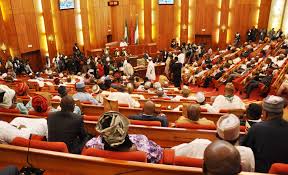Nigerian Senate finally passes Buhari’s anti-corruption bill
The Nigerian
Senate has on Tuesday passed an executive bill proposed to enlist international
assistance in the country’s efforts to tackle criminal matters, including money
laundering, asset acquisition from proceeds of corruption and other forms of
illicit financial flows.
The proposed
law, Mutual Legal Assistance in Criminal Matters Between Nigeria and Other
Foreign Countries, SB 224, 2017, was read for the third time and subsequently
passed by the Senate on Tuesday.
The passage
followed the presentation of the joint report on the bill by the Senate
committees on foreign affairs, chaired by Monsurat Sunmonu (APC-Oyo);
judiciary, human rights and legal matters, chaired by David Umaru (APC-Niger)
and anti-corruption, chaired by Chukwuma Utazi, PDP-Enugu.
The bill –
and another one on Money Laundering Prevention and Prohibition – was sent to
the Senate by President Muhammadu Buhari on January 27, 2016, before it was
finally passed by the lawmakers on Tuesday.
The bill
seeks to get relevant international assistance in cases of money laundering and
provide framework for “other countries to assist in provision of and obtaining
of evidence, making of arrangements for persons to give evidence”.
“The bill
also hopes to elicit international assistance in criminal investigations,
recovery, forfeiture or confiscation of property in respect of offences.
“The
restraining of dealings in property or the freezing of asset that may be recovered,
forfeited or confiscated in respect of offences.
“The
execution of request for search and seizure, the location and identification of
witnesses and suspects,” Mr. Buhari wrote to the Senate in January 2016.
There is no
report yet on the second one, Money Laundering Prevention and Prohibition Bill,
sent same day as the one on mutual legal assistance.
With the approval of the bill by the Senate, a
similar approval by the House of Representatives is required before a joint
approval by the National Assembly following which the bill will be sent to the
president for assent.



Comments